Click on a Book to get More Information and Download a Free Chapter
All of Dr. Marshack’s Books are available at Amazon.com.
EBOOK Specials can be ordered here Dr. Kathy Learning Center.

Get the Paperback
Get the Audiobook
Get the eBook Special
Going Over the Edge:
Life With a Partner or Spouse With “Asperger Syndrome” – ANNIVERSARY EDITION
“‘Going Over the Edge?’ is bold, brave, and beautiful. I love how you define “Aspie” dynamics and create a language around stuff that is almost indescribable. I cried a bunch of times. It means so much that someone really understands what this life is like and can describe how the solution is more than the NeuroTypical (NT) being accommodating and understanding. I love hearing about the author’s personal experience and knowing that she gets it! I want my therapist to read this book.”
“Dr. Marshack gives relatable examples of living with someone who has ‘Aspergers’ and offers effective advice from her years of experience with family members on the Spectrum and counseling families dealing with the same/similar issues. ‘Going Over the Edge?’ is a must-read for anyone living with someone on the Spectrum. I laughed and cried at the same time. It is comforting to know you are not the only person dealing with these issues.”
“Going Over the Edge?” is a one-of-a-kind “Asperger Syndrome” book on the Amazon best-seller list for books on Behavioral Disorders.
The Anniversary edition of Dr. Marshack’s classic has been augmented with updates on theory and terminology plus practical tips for saving you and your relationship. Her goal, with this informative and easy-to-read book, is to help you learn how to take back your life. Using the tools discussed in this book, many NeuroDivergent couples have succeeded in reclaiming the love lost in the chaos of NeuroDivergence. “Going Over the Edge?” is like a tool kit and first aid kit melded to help your relationship evolve to a saner, more companionable state.
Important additions to this edition are the Map of Empathy Territory and the 7 Step Interface Protocol, both innovative tools developed by Dr. Marshack to guide you through complex and confusing NeuroDivergent relationships. To help you expand your communication skills, Dr. Marshack provides a Lexicon of new terms which make it easier to bridge the gap between the worlds of the NeuroDiverse and NeuroTypical.
Dr. Marshack reveals touching and tragic personal secrets. Many readers of the first edition have wondered how she knows the main protagonist, Helen, so well. The author finally admits that she is Helen. To help readers living in NeuroDivergent relationships realize they do have choices, Dr. Marshack divulges even more about the trauma, heartbreak, estrangement, miracles, and healing of her NeuroDivergent life.
An established psychologist for more than 36 years and a prolific writer on Autism, “Asperger Syndrome,” NeuroDivergent relationships, Empathy, and Empathy Dysfunction, Dr. Marshack’s professional training and personal experience as the daughter, wife and mother of NeuroDiverse family members, adds profound and solid highlights to this enhanced edition of “Going Over the Edge?”
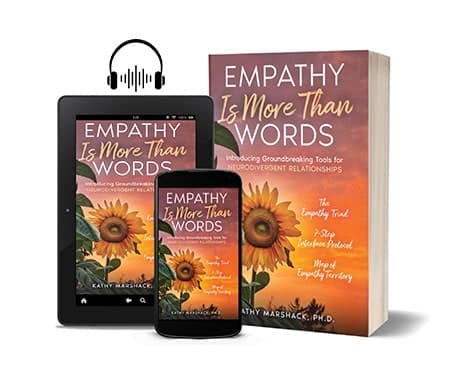
Get the Paperback
Get the Audiobook
Get the eBook Special
Empathy is More than Words:
Introducing Ground Breaking Tools for NeuroDivergent Relationships
“Empathy Is More Than Words” is an excellent addition to Dr. Kathy Marshack’s line of books that serve as primers for relating to people who lack Empathy because of Autism, traumatic brain injury, addiction, or illness. She takes a deep dive into the essence of Empathy.
Enter a roomful of people and, if you have Empathy, you unconsciously gauge who has—or doesn’t have—Empathy. How is it that you can do so, but those without Empathy cannot? To answer this, Dr. Marshack leads her readers on a profound journey into the intrinsic nature of Empathy. She addresses many of the troubling communication conundrums that plague relationships between the NeuroTypical (NT) and the NeuroDiverse (ND).
“NeuroDiverse” (ND) describes the unique workings of a brain that is different from those with typical neurological development or functioning; hence, the term, “NeuroTypical.” A relationship between a person who is NeuroDiverse and another who is NeuroTypical is considered “NeuroDivergent.”
An established psychologist for more than 35 years and a prolific writer on Empathy and Empathy Dysfunction (EmD), Dr. Marshack confronts myths about Empathy head-on and clearly demonstrates how Empathy is indeed more than words. She introduces her newest discovery, Radiant Empathy. The epitome of Empathy, Radiant Empathy goes well beyond having an empathic understanding of another individual. It is the willingness to forgive yourself and others while commanding the courage and wisdom to stand up for those who are suffering, perhaps from PTSD episodes triggered by new trauma. Forgiveness, emphasizes Dr. Marshack, is fundamental to Radiant Empathy.
A stand-out example of Radiant Empathy is seen in a poignant photo taken 11 days into the 2022 Russian invasion of Ukraine. It depicts a line of empty strollers and prams, collected by Empathetic Polish mothers and left waiting at a Poland train station for the Ukrainian mothers who would soon arrive with next to nothing. This telling photo of steadfast Radiant Empathy appeared in media worldwide.
Several “out-of-the-box” tools unfold in this book, including the Empathy Triad, which represents the relationship of Empathy to Context and Conversation; and the 7-Step Interface Protocol, which can bridge the psychological divide between the NeuroTypical and the NeuroDiverse.
Many NeuroDivergent couples have sought out Dr. Marshack for relationship help. Using the tools discussed in this book, they have succeeded in reclaiming the love lost in the chaos of NeuroDivergence. Open this tool chest of a book, and you, too, can help your relationship evolve to a saner, more companionable state.
Curious readers will discover how a grizzly bear, pirates, software development, Pepto Bismol, confetti, the witches of Oz, Monica Lewinsky, Malala Yousafzai, and Autistic comedienne Hannah Gadsby factor into the author’s fascinating discoveries about Empathy.
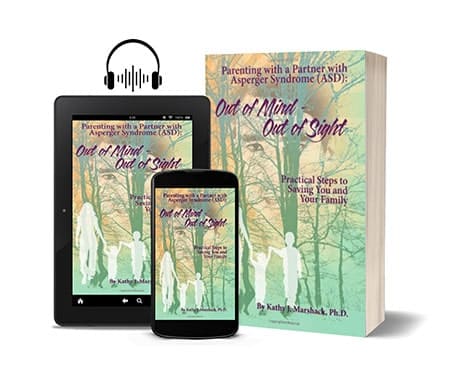
Get the Paperback
Get the Audiobook
Get the eBook Special
Out of Mind—Out of Sight:
Parenting with a Partner with “Asperger Syndrome” (ASD)
“I just learned of your book [“Out of Sight—Out of Mind”] about parenting when your partner is on the Autism Spectrum. My wife and I are on the Spectrum as are our children. I train parents to more effectively collaborate and raise their children on the Spectrum. I’m repeatedly asked if there are any books on the very subject you’ve written on. Yours is the first I’ve heard about. I’ll gladly let my clients know about it.”
“Hands down the best book about parenting with an ASD spouse and having a mixed NT/ASD family.
Dr. Marshak speaks from her experience as well as her clients’, gives tips, clues, and science-backed truths as to why ASD people behave the way they do and how it influences their families. Trying to navigate this life is so hard. Dr. Kathy makes you feel seen and heard. Unless you walk these roads, you just cannot comprehend it.”
_____________________
Maddening, frightening, and unpredictable describe the life of a family when a member(s) has Autism Spectrum Disorder (ASD). The NeuroTypical’s (NT) Empathy and the “Aspie’s” lack of Empathy are at the crux of this chaos, advises author Dr. Kathy Marshack, a longtime psychologist and prolific writer on Empathy, NeuroDiversity (ND), and NeuroDivergent relationships. “NeuroDiverse,” describes the unique workings of a brain that is different from those with typical neurological development or functioning; hence, the term, “NeuroTypical.”
An NT/ASD relationship mirrors dance partners who unintentionally step on each other’s toes. With instruction, the rhythm of their dance can shift. The author provides dozens of proven tips and tools that help achieve smoother footwork—as she learned from living with an ASD spouse, an ASD daughter, and an NT daughter. Since Empathy is not wired into the brain of someone with ASD, they are left feeling confused by irony, pretense, metaphor, and white lies. “Aspies” are unable to simultaneously know their feelings and sense another’s; hence, can’t know or see what to do or say next. Frustrating to NTs, “Aspies” live in the moment: If something is not forefront in their mind, it is essentially out of their sight. Their failure to recognize the importance of a smile, a hug, or a word of encouragement can generate a mountain of pain and loneliness for the NT.
Children of an ASD/NT couple may inherit or learn the traits of both parents and grow up feeling invisible, minimized, ignored, and unloved. “An NT/ASD couple,” emphasizes Dr. Marshack, “must take immense care to reinforce a child’s self-esteem while teaching them to love and be loved. It is a profound and not easy challenge.”
Dr. Marshack dispels preconceived notions about ASD. She opens eyes and hearts to see that an NT/ASD family’s roller-coaster ride—when slowed to ease the curves and jolts—can lead to positive transformation in relationships.
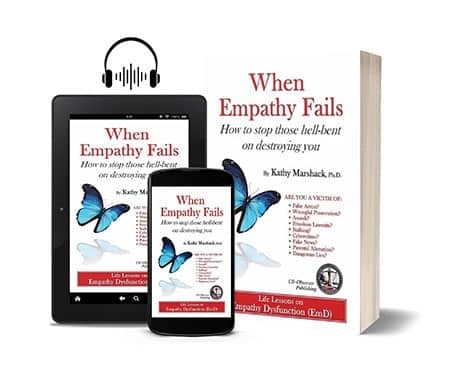
Get the Paperback
Get the Audiobook
Get the eBook Special
When Empathy Fails:
How to Stop Those Hell-Bent on Destroying You
“…the book is engaging when it addresses Marshack’s five levels of “EmDs.” The second chapter does a particularly good job of describing each one of these… The EmD levels do resonate, and the implications of empathy dysfunction become clear.”
—Kirkus Reviews
“A Must Have! Combine equal parts trauma, tenacity, courage, mama-bear energy, and determination to help others, then add big dollops of empathy and wisdom, and you have this book. Dr. Kathy Marshack survived the unthinkable and tells her story loudly and clearly, offering others in relationships with unscrupulous people a roadmap out of their suffering. She designed the Empathy Dysfunction Scale to deepen our understanding of the range of human empathy disorders… If you are struggling with mean people or confused about your loved one’s behavior, I highly recommend reading this book.”
—Dr. Julie Glass
_____________
Just plain mean. That’s how many would see it if: their best friend swindled them; a cyberbully harassed them; a neighbor filed complaints about fabricated wrongdoings; or they befriended a good-looking stranger who inched into their life and hijacked it.
If any of this sounds familiar, “Beware,” advises Dr. Marshack. “These ‘innocents’ may be more than liars or cheats. They may be narcissists, even sociopaths, who are living with Empathy Dysfunction (EmD), putting NeuroTypicals in harm’s way.” “NeuroDiverse” (ND) describes the unique workings of a brain that is different from those with typical neurological development or functioning; hence, the term, “NeuroTypical” (NT).
When Empathy Dysfunction is afoot, Empathy has failed. To demystify the puzzling—often maddening—world of EmD, Dr. Marshack invented the Empathy Dysfunction Scale. It identifies the severity of EmD, ranging from EmD-0 (having zero degrees of Empathy but not intending harm) to EmD-5 (epitomizing Empathy).
“When Empathy Fails,” the latest from thislong-established psychologist and prolific writer on Empathy and Empathy Dysfunction, is a far cry from the dry psychological treatise expected when discussing Autism, “Asperger Syndrome,” addiction, or TBI. It is a hair-raising memoir with lessons and warnings about EmD clues that should not be ignored. She documents how Empathy Dysfunction in her family and community nearly destroyed her personally and professionally.
“This book,” said Edward Snook, publisher of the ‘US~Observer,’ “is an imperative read for [crime] victims, law enforcement personnel, and those working in the legal system.” On Snook’s watch, the newspaper published several investigative articles about the critical damage vigilante justice and wrongful prosecution wrought on Dr. Marshack and her family. A groundbreaking book, it should be a dog-eared reference for anyone living in the shadow of Empathy Dysfunction.
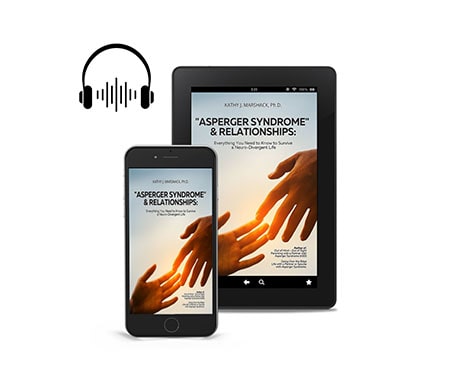
Get the Audiobook
Get the eBook Special
“Asperger Syndrome” & Relationships:
Everything You Need to Survive a Neuro-Divergent Life
“Kathy, you have opened doors that help me to be more gracious and accepting toward my husband’s struggles without becoming an ‘object.’”
“Amen. Thank, you Dr. Kathy. [From] Xoxox [who is] feeling encouraged for the first time in days.”
“Wow!! This was awesome, so well explained!! I found myself remembering how it feels with similar ‘missed’ understandings by my [Autistic] partner. It feels like he misses 99.9 percent of me, just can’t get into my head. . . Not sure he even knows I have a mind, except when I tell him.”
“Thank you! Your [blog] post felt like a tall glass of water after 10 years in a drought. [I’m] expecting someday you will be nominated for a Nobel Peace Prize.”
“Bad-ass” is how clients and colleagues refer to Dr. Kathy Marshack. She investigates in-depth, then explains the nature of relationships between people who have “Asperger Syndrome” and are on the Autism Spectrum and those who are not. She doesn’t hold back!
Her casual writing style both engages and informs readers. The author begins the book with an explanation of unfamiliar “Aspergian” nomenclature, such as “NeuroTypical” (NT) and “Empathy Dysfunction” (EmD), a term coined by Dr. Marshack. The term, “NeuroDiverse” (ND) describes the unique workings of a brain that is different from those with typical neurological development or functioning; hence, the second descriptive term, “NeuroTypical.” A relationship between a person who is NeuroDiverse and another who is NeuroTypical is considered “NeuroDivergent.”
The author, a well-established and prolific writer on Empathy and Empathy Dysfunction, explains that Empathy is more than being sensitive: It is the ability to hold on to your thoughts and feelings while acknowledging the thoughts and feelings of another person. “Aspies,” the author adds, “struggle to integrate these parts. This leaves them unable to relate to cues, conversation pauses, ambiguity, metaphors, innuendo, or rambling. It is why Autistics face challenges with interpersonal communication.” This behavior, emphasizes Dr. Marshack, is not the fault of the “Aspie.” She counsels clients and readers to use a workaround she refers to as their personal Rules of Engagement.
“‘Asperger Syndrome’ & Relationships: Everything You Need to Survive a NeuroDivergent Life” is fashioned for readers to pick and choose which parts to read first, then return to for reassurance when experiencing things such as the silent treatment or PTSD.
To craft this book, Dr. Marshack drew on a decade’s worth of blogs about her personal experience with NeuroDivergence and her more than 35 years as a licensed psychologist. It helps readers — perhaps for the first time — get answers to the mysteries of life with an adult on the Autism Spectrum.
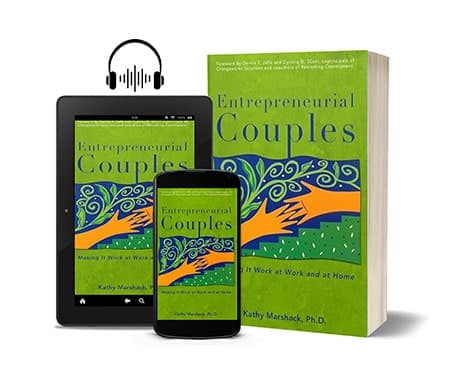
Get the Paperback
Get the Audiobook
Get the hardback
Get the eBook Special
Entrepreneurial Couples:
Making It Work at Work and at Home
Caught in the squeeze of trying to maintain two careers in today’s tough corporate climate, more and more couples are giving up their jobs in order to start their own businesses.
Whether they work together in a business or are each owners of a separate enterprise, these entrepreneurial couples face a daunting task–balancing the competing demands of love and work. “The couple bond is a significant element in the success of entrepreneurial businesses,” says psychologist and business consultant Kathy Marshack in Entrepreneurial Couples. “Not only do these partners negotiate with each other for love, sex, status, and support, but they also depend on the relationship for their own self-definition.”

Get the Paperback
60 Things To Do When You Turn 60
Dr. Marshack contributed to this collection of 60 sixty essays with, “Go Directly to Jail.” Find out how humility and an unwelcome event can change everything.
Thanks to the generosity of the contributing authors, all of whom provided essays on a pro-bono basis, the royalties generated from the sale of this book will be donated to non-profit organizations dedicated to preventing and curing cancer.
Approximately 10,000 baby boomers turn 60 every day. Thats approximately 3.5 million people a year who will be celebrating this event in North America. We have the perfect gift of reading for the 60-somethings in your life. 60 Things To Do When You Turn 60 is a thoughtful, humorous, and sometimes provoking collection of essays written by people from all walks of life on the subject of turning 60.


